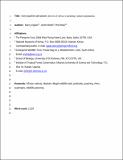Ivory poachers and poison : drivers of Africa's declining vulture populations
Abstract
Four species of African vultures have been recategorized as Critically Endangered, and two as Endangered, on the IUCN Red List. Their declining status is attributed partly to the impacts of widespread poisoning. Prior to 2012 poisoning of vultures was mostly associated with illegal predator control by livestock farmers, in which vultures were typically unintended victims. More recently, ivory poachers have been using poisons to kill elephants Loxodonta africana or to contaminate their carcasses specifically to eliminate vultures, whose overhead circling might otherwise reveal the poachers’ presence. Between 2012 and 2014 we recorded 11 poaching-related incidents in seven African countries, in which 155 elephants and 2,044 vultures were killed. In at least two incidents the harvesting of vulture body parts (for fetish) may have provided an additional motive. We show that vulture mortality associated with ivory poaching has increased more rapidly than that associated with other poisoning incidents, and now accounts for one-third of all vulture poisonings recorded since 1970. This recent surge in the illegal use of poisons exposes weaknesses in the regulations, for which we propose measures aimed primarily at retail controls. However, because ivory poachers already operate outside any legal framework, African governments require international support in applying more punitive sentencing against mass wildlife poisoning.
Citation
Ogada , D , Botha , A & Shaw , P 2015 , ' Ivory poachers and poison : drivers of Africa's declining vulture populations ' , Oryx , vol. FirstView . https://doi.org/10.1017/S0030605315001209
Publication
Oryx
Status
Peer reviewed
ISSN
0030-6053Type
Journal article
Collections
Items in the St Andrews Research Repository are protected by copyright, with all rights reserved, unless otherwise indicated.

